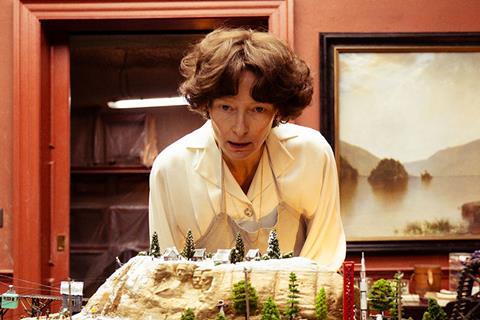Joshua Oppenheimer’s first drama is a singular musical which details how one family passes through the end of the world

Dir: Joshua Oppenheimer. Denmark/Germany/Ireland/Italy/UK/Sweden. 2024. 150 mins
In his acclaimed documentaries about mass killings in Indonesia, The Act Of Killing and The Look Of Silence, Joshua Oppenheimer examined the darkest aspects of human nature. On its face, his feature debut would seem equally bleak, following a family that has lived underground for decades after the destruction of the planet. But while there is certainly much that is despairing about The End, what is remarkable is how much the film focuses on the beauty in such a grim scenario — and that’s before the characters start breaking into song. A mixture of domestic drama, apocalyptic fable and old-fashioned (and unironic) Hollywood musical, The End is an audacious and frequently enrapturing experience, with superb performances at its emotional heart.
A meditation on how we all rationalise the terrors right outside our door
A who’s who of arthouse stars, including Tilda Swinton, George MacKay and Michael Shannon, head up the cast, and The End’s ambitious approach will make this a must-see for discriminating audiences. Greeted with mostly respectful reviews after its Telluride premiere, the picture may struggle to cross over into the mainstream, and likewise awards-season consideration could be a challenge. But anyone interested in a story about the end of the world which is far different from other such films would do well to seek out this picture.
It has been approximately 25 years since Earth has become uninhabitable, but a well-to-do family has thrived in a bunker loaded with priceless art as they try to maintain a traditional daily existence. The family members are identified only as Mother (Swinton), Father (Shannon) and Son (MacKay), who was born after the environmental catastrophe that laid waste to the planet. One day, though, they are visited by a stranger, Girl (Moses Ingram), a lone survivor who made her way to their home. Initially, they want to send Girl off, but Father takes pity on her, and soon she and Son develop romantic feelings for one another.
The End’s production design, courtesy of Jette Lehmann, thrusts us convincingly into this claustrophobic realm in which there is no life outside of the family’s domicile, an upscale manor home that seems elegant – until one remembers what has happened to the rest of humanity. Not surprisingly, this is precisely what the family — as well as a few people they brought along, including Doctor (Lennie James) and Butler (Tim McInnerny) — have achieved over the last quarter-century, carefully manufacturing an elaborate facade of normalcy.
But there’s also an element of revisionist history going on as Father, a former executive in the energy field, tasks Son with writing his biography — one in which he is not complicit in the global warming that killed off the Earth’s inhabitants. However, Oppenheimer, who co-wrote the screenplay, doesn’t settle for cheap satire at the expense of the clueless one-percent, instead thoughtfully investigating the poignancy of this family who want to keep the horror of their situation out of their consciousness.
With that in mind, the use of original musical numbers is inspired, further emphasising the unreality in which these characters dwell. With music by Joshua Schmidt and lyrics by Oppenheimer, the songs recall the golden age of Broadway and Hollywood musicals, the tunes full of lilting strings and swooning melodies. Whether it’s Son and Girl falling in love or Father reflecting on his past mistakes, The End is lit up by these soaring songs, the choreography often very simple but effective. Because Oppenheimer is not trying to parody musicals — or mock the characters’ disconnect from reality — something far more moving transpires. Quite cannily, The End becomes a meditation on how we all rationalise the terrors right outside our door, immersing ourselves in music, routine and other distractions. This family may be deluded, but their inner lives are so rich that we come to care about their plight as the fragile last remnants of humanity.
The performances are uniformly stellar, with Ingram an especially powerful singer. As the sheltered Son, MacKay plays his character’s naivety with disarming sweetness, while Swinton and Shannon portray a long-term couple who have had to accept the choices they’ve made — including which family members and friends they would allow in the bunker with them. Oppenheimer’s Indonesia documentaries suggested a filmmaker who refused to look away from the cruelty humans inflict on one another. With The End, he manages to find a few scraps of hope, even though the picture’s devastating final sequence argues that optimism can only take our doomed species so far.
Production company: Final Cut for Real
International sales: The Match Factory, info@matchfactory.de
Producers: Signe Byrge Sorensen, Joshua Oppenheimer, Tilda Swinton
Screenplay: Rasmus Heisterberg, Joshua Oppenheimer
Cinematography: Mikhail Krichman
Production design: Jette Lehmann
Editing: Niels Pagh Andersen
Music: Joshua Schmidt, Marius de Vries
Main cast: Tilda Swinton, George MacKay, Moses Ingram, Bronagh Gallagher, Tim McInnerny, Lennie James, Michael Shannon

























No comments yet